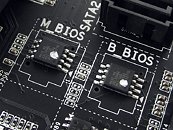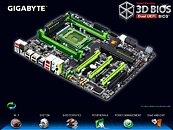Monday, June 18th 2018

AMD Motherboard Vendors Are Removing Support for Older CPU Models
Current AMD AM4 motherboards basically support four platforms at the moment: the new Ryzen 2000 processors, Ryzen 2000 G APUs with integrated graphics, 1st generation Ryzen and Bristol Ridge. Bristol Ridge was AMD's last processor generation before Ryzen was released. Bristol Ridge introduced Socket AM4, which according to AMD has a lifespan beyond 2020. According to Anandtech, several motherboard manufacturers are now reporting that they might drop support for Bristol Ridge in their future motherboard releases. The underlying reason is that in addition to the setup interface, and UEFI with its driver and network stack, the BIOS has to support all processors by including microcode for them.
Supporting so many CPU models bloats the size of the BIOS beyond 128 megabits (16 MB), which would exceed the capacity of the BIOS flash chips used by most vendors and force them to use higher capacity models, ie 256 megabits. As always in this industry, the issue here comes down to pricing.A 128 Mb flash chip costs less than half as much as a 256 Mb chip - a cost that motherboard vendors seem reluctant to cover, especially considering the limited commercial success of Bristol Ridge. We're talking about $3-4 price differences here, which sounds like nothing at first, but will add up with millions of motherboards shipped. Also these few dollars could make you lose a price advantage over a competitor.
There is no question that the vast majority of processors used on AM4 motherboards will be Ryzen; the only mention of Bristol Ridge that I've seen in recent times is, ironically, that the processor that AMD ships to users to upgrade their BIOS for Ryzen support is Bristol Ridge, as that's the cheapest way to get an AM4 system up and running. So the reality is that Bristol Ridge support will be irrelevant for 99% of future AM4 motherboards.
Instead of dropping Bristol support, motherboard vendors could release special BIOS versions that support only Bristol Ridge, but not Ryzen, and vice versa. This seems highly unlikely as it would significantly increase complexity for qualification and maintenance of the BIOS and the chances of people flashing the wrong BIOS version would be high, too. Maybe we could see a reduction in the BIOS fanciness that we saw with the introduction of UEFI. Do we really need all the bells and whistles that modern UEFI-style BIOSes offer? Last but not least, two BIOS chips could be used in a RAID-0-like striping configuration, combining their capacity. Such an approach probably wouldn't be much cheaper and the added design complexity and PCB space usage would offset all cost savings.
Source:
Anandtech
Supporting so many CPU models bloats the size of the BIOS beyond 128 megabits (16 MB), which would exceed the capacity of the BIOS flash chips used by most vendors and force them to use higher capacity models, ie 256 megabits. As always in this industry, the issue here comes down to pricing.A 128 Mb flash chip costs less than half as much as a 256 Mb chip - a cost that motherboard vendors seem reluctant to cover, especially considering the limited commercial success of Bristol Ridge. We're talking about $3-4 price differences here, which sounds like nothing at first, but will add up with millions of motherboards shipped. Also these few dollars could make you lose a price advantage over a competitor.
There is no question that the vast majority of processors used on AM4 motherboards will be Ryzen; the only mention of Bristol Ridge that I've seen in recent times is, ironically, that the processor that AMD ships to users to upgrade their BIOS for Ryzen support is Bristol Ridge, as that's the cheapest way to get an AM4 system up and running. So the reality is that Bristol Ridge support will be irrelevant for 99% of future AM4 motherboards.
Instead of dropping Bristol support, motherboard vendors could release special BIOS versions that support only Bristol Ridge, but not Ryzen, and vice versa. This seems highly unlikely as it would significantly increase complexity for qualification and maintenance of the BIOS and the chances of people flashing the wrong BIOS version would be high, too. Maybe we could see a reduction in the BIOS fanciness that we saw with the introduction of UEFI. Do we really need all the bells and whistles that modern UEFI-style BIOSes offer? Last but not least, two BIOS chips could be used in a RAID-0-like striping configuration, combining their capacity. Such an approach probably wouldn't be much cheaper and the added design complexity and PCB space usage would offset all cost savings.


30 Comments on AMD Motherboard Vendors Are Removing Support for Older CPU Models
New GCN generation doesn't necessarily require major new ISA (like jump from gfx700 to 800 to 900), but since you bought in the subject, gfx810 is Stoney only, not Bristol Ridge - in fact, Bristol Ridge doesn't even get it's own name anywhere, it's listed as Carrizo (gfx801).
llvm.org/docs/AMDGPUUsage.html
Graphics/Compute: GFX8 (gfx803)
Display Core Engine: 11.2
Unified Video Decoder: 6.3
Video Compression Engine: 3.4
Bristol-Ridge with R7/R5 graphics is using Wani:
Graphics/Compute: GFX8 (gfx801)
Display Core Engine: 11.0
Unified Video Decoder: 6.0
Video Compression Engine: 3.1
Stoney-Ridge with R2/R3/R4/R5 is using Stoney:
Graphics/Compute: GFX8 (gfx810)
Display Core Engine: 11.0
Unified Video Decoder: 6.2
Video Compression Engine: 3.4
Both are still DCE11.0 but Stoney has the updated VCE that Polaris uses. Stoney still does not support HEVC encoding, a feature which was added with UVD6.3.Polaris12 is gfx804, not gfx810. RX 580, RX 570, and RX 560 are still gfx803. Stoney is the only middle-child so to speak when it comes to feature mixing.It isn't stated anywhere that AMD are the ones pulling the plug here. The article refers exclusively to motherboard vendors not wanting to increase their assembly costs with the larger flash memory chips, leading to the solution of clearing out the older APUs to make space for next-generation Ryzen CPU microcode.
intel: people can't upgrade CPU without a new MB
AMD: people may not be able to upgrade MB without a new CPU
The difference is that people routinely seek to upgrade CPU for better performance but few people upgrade MBs as most MB improvments can be achieved with pci-e addon cards, no reason to get a new MB.
So there're lots of people feel they're forced to buy a new intel MB but few people would people would feel the same way when buying a new AMD MB.
I then see people saying "thats ok because nobody is using Bristol Ridge". That may be partially true, but these people are missing the point. The point is that because of UEFI, bios chips are nearing their capacity as things are. Even if they remove Bristol Ridge support, AM4 boards will need further bios updates for newer ryzen processors (Ryzen 2) which will also might exceed the bios chips capacity because of the extra microcode needed.
This is not a solution, it's just a patch for a problem which will occur sooner or later anyway.